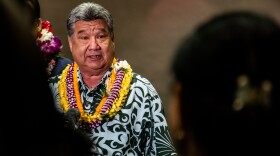The Hawaiʻi Board of Education consists of 11 members — including lawyers, former education administrators, and even a former U.S. diplomat.
However, the board doesn't actually have any teachers on it.
"Right now, the Board of Education has a student representative, and so their voice is valued. They have a military representative, and their voice is valued," said Osa Tui Jr., president of the Hawaiʻi State Teachers Association.
"We just don't understand why you wouldn't want to have a 'teacher voice' there."
HSTA represents 13,700 teachers in the state — most of which are at public schools. The union published its legislative priorities last month, ranging from better investment in educational facilities to advancing affordable housing. One of its priorities in this session is to have a teacher on the BOE — in a non-voting capacity.
"We just feel that if we had a teacher on the board, they could bring up these issues in the meetings," said Tui. "Or they can advocate with their fellow board members, as opposed to us just being on the outside trying to get them to bring up issues."
According to Tui, the union has repeatedly requested for the board to address issues surrounding special education and English learning programs. Both face funding and staffing challenges at the ground level.
Teachers can voice their concerns to the board in the form of public testimony, which is capped at three minutes. However, the board generally meets on Thursdays — during school hours.
"It's really their voice from inside the classroom. Depending on what area they're from, there are different issues going on," said Mitzie Higa, HSTA's government relations specialist.
"It really matters what they think, and what they need. We don't always get that at a higher level. We don't always get that at the BOE, and we don't get that always from the legislature unless it's through testimony."
House Education Chair Rep. Justin Woodson has said that he supports the idea of having a teacher on the board. He tells HPR that attempts to add a teacher to the BOE have failed in previous legislative sessions, but he "doesn't know why."
Woodson introduced the proposal in the 2020 legislative session, which didn't advance out of the House.
Another supporter of having a teacher on the BOE is Rep. Jeanné Kapela.
"The fact that we don't have a teacher on the BOE speaks to why our public schools are underfunded, why it's difficult to get teachers' pay raised," she said. "If we really want some of these things that transform our public schools into centers of excellence, then having a teacher on the BOE is the easiest, best first step."
Members of the state Board of Education are appointed by the governor and approved by the state Senate. Members are appointed based on their expertise to lend to board actions.
However, some have said that one challenge is the potential for a conflict of interest.
"The State of Hawaiʻi's conflict of interest law prevents state employees from taking official action that affects their financial interest," said Robert Harris, executive director of the state Ethics Commission.
"State employees, for example, can't decide to award a state contract to a business they own. They can't decide to give a license, or something else, that benefits — say their spouse."
The potential conflict could arise during contract negotiations. The board is in charge of negotiating collective bargaining agreements with unions, such as HSTA and HGEA — which represents schools and DOE administrators.
But according to Harris, there is an exception to the law, which lawmakers have to weigh.
"For example, if a banking industry has a seat specifically reserved for bankers, it's presumed the Legislature believes that having that specialized knowledge or experience on the commission was in the state's best interest," Harris said.
"It's also presumed that bankers may have a conflict of interest in overseeing the banking industry. But on balance, the Legislature decided that this particular qualifications were necessary to have a better commission."
Harris tells HPR when it comes to conflict of interest, teachers would have to recuse themselves if the board was making a decision that directly or substantially impact them — either decisions on their school or their subject matter.
"Previously, the Ethics Commission reasoned that if a law was passed, that required teachers to sit on the Board of Education, the narrow exception to the conflicts of interest law would apply," said Harris. "That member could vote on matters impacting the teachers, generally, they just couldn't vote on matters that directly and specifically impacted themselves."







